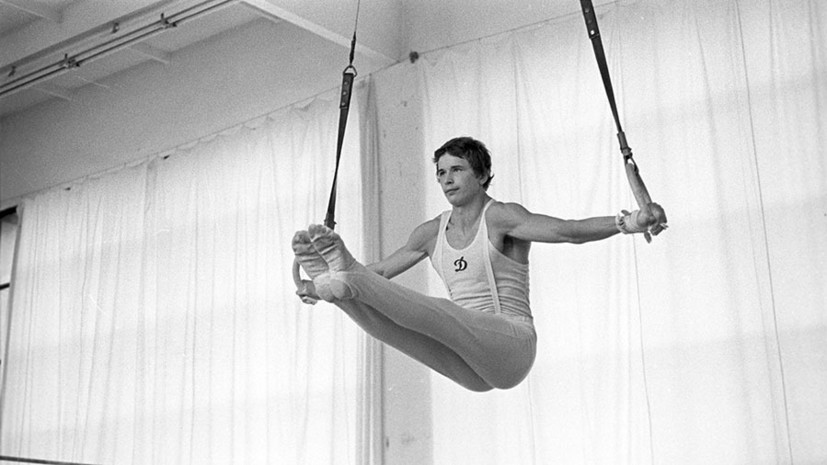40 years ago, one of the most significant records in the history of the Olympic Games fell, which was shared by gymnasts Nikolai Andrianov, Boris Shakhlin, Mikhail Voronin and Maria Gorokhovskaya, swimmer Mark Spitz, shooters Willis Lee and Lloyd Spooner. They were united by the fact that they managed to win seven medals in one year. But on July 25, 1980, they were all overshadowed by Alexander Dityatin. At the Games in Moscow, he became the first to climb the podium eight times.
Dityatin began his career in artistic gymnastics rather late. At the age of nine he ended up in the "Dynamo" section and began to train under the leadership of Anatoly Yarmovsky. Dityatin was quite tall for his kind of youth sports (177 cm), but quickly began to achieve success. Already at the age of 17, he got into the USSR national team and immediately won the bronze of the European Championship in the all-around.
Soon, Dityatin went to his first Olympic Games in Montreal. He won two silver medals in the team championship and in exercises on the rings, and in the individual championship he took the honorable fourth place for the 19-year-old athlete.
However, after the native of Leningrad was out of action for a long time due to an elbow injury. The next major tournament for him was the 1978 World Cup. On it, Dityatin managed to win four medals, but at the same time he never rose to the highest step of the podium. A year later, Alexander filled the gap by winning four gold medals, including in the most prestigious event - personal all-around. So he became the main favorite of the next home Olympics.
The final stage of preparation for the Moscow Games took place in Minsk, where the national gymnastics team was to be based for 40 days. This gathering was overshadowed by a real tragedy. During training, three-time world champion Elena Mukhina landed unsuccessfully on her neck and broke her spine. Dityatin admitted that the team was shocked by what had happened and the mood before the competition was appropriate. But still, after arriving in Moscow, both he and other Soviet gymnasts managed to tune themselves in the right way.
Due to the boycott, the national teams of the USA and Japan did not arrive at the Olympics. But this circumstance did not mean at all that one of the Soviet gymnasts could easily get eight medals at once. Firstly, the competition within the national team was also high, and a compatriot could well deprive a personal award in any discipline. Secondly, the format of the Olympic events and their schedule were much more exhausting than they are today.
Gymnasts in Moscow had to endure a real marathon. To begin with, they were required to perform 12 times on shells in the team all-around. Then there was a personal championship with six more approaches. Finally, immediately after that, without an extra day to rest, all six finals in separate exercises were on the schedule. The entire tournament was supposed to take place within six days.
To win eight medals, it was necessary not only to perform without a break, but also to do it efficiently, at the highest level. With this, Dityatin had no problems. In the compulsory and free competitions of the team all-around, he received an assessment of 9.90 or 9.95 points seven times, very close to the maximum possible. The 22-year-old gymnast did not drop below 9.8 points. So he won his first gold.
In the final of the individual championship, Dityatin performed even more impressively. For the vault, he was the first male gymnast to earn 10 points at the Olympic Games. Before him, only girls succeeded, the first of whom was the Romanian Nadia Comaneci. Until the maximum possible result in six exercises, the Child lacked only 0.55 points and naturally won.
But the most difficult thing was ahead of him - it was to compete in one day for six medals on separate shells. The final result then was influenced by the points scored during the team championship, and Dityatin risked being left without an award in floor exercises. But in the final, he was able to reach bronze. In other disciplines, the medals turned out to be more valuable - the native of Leningrad won silver in the vault, on horseback, parallel bars and the crossbar, and on the rings he won the third gold for himself.
“Dityatin amazes not only with amazing purity of performance, chased severity of style, but also with amazing stability. For four years from Montreal 1976 to Moscow 1980, Alexander steadily climbed up to sports heights. At the Games of the XXII Olympiad, Dityatin proved that he has no equal on the platform, ”said the senior coach of the USSR national team Leonid Arkaev about his ward.
Dityatin was the first in history to win eight medals at one Olympics, and he did it in a sport where the judges could well evaluate his performance in some other way and make it impossible to set a record. For his achievement, the gymnast received 3600 bonus rudders, and was also able to improve living conditions in Leningrad by exchanging a three-room apartment for a four-room one.
Dityatin's record still remains unbeaten, but swimmer Michael Phelps was able to repeat it. The American climbed eight times to the podium during the Games in 2004 and 2008. At the same time, Dityatin is still the only one in history who won seven personal awards in one Olympics.

